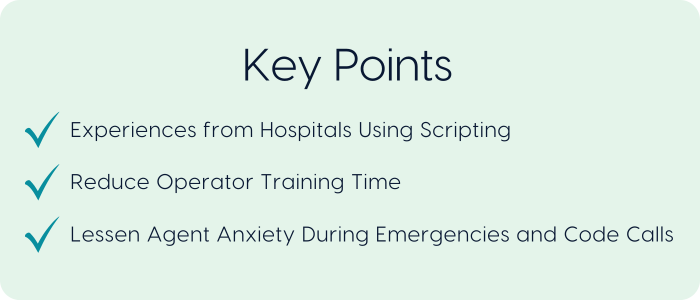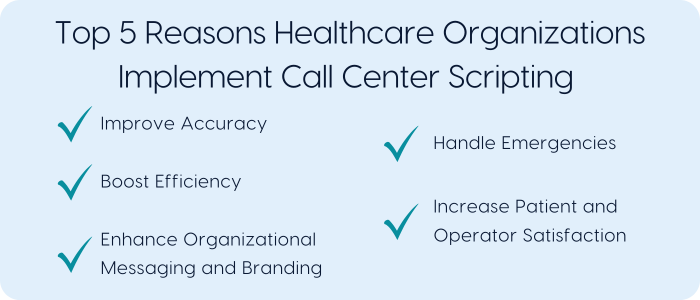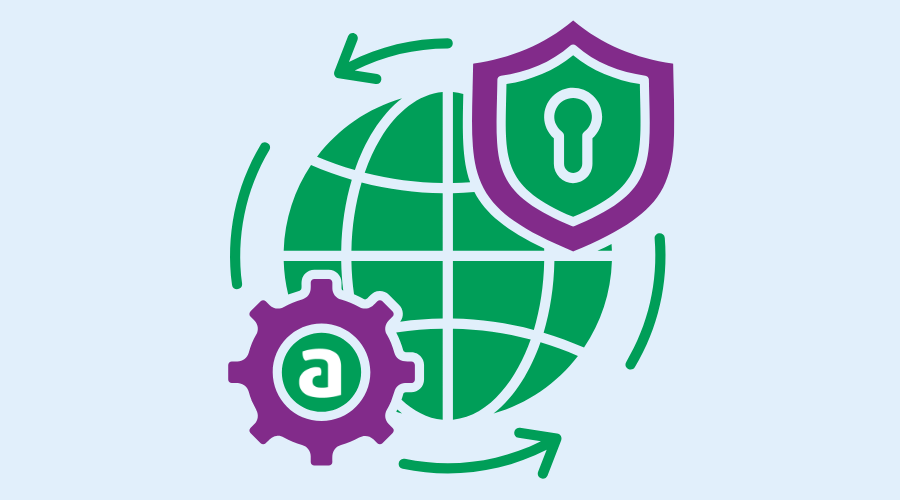One of the first person-to-person connections a patient makes with a healthcare organization is often through a phone call. Whether the caller intends to schedule an appointment, ask a question, or report an emergency, how an operator handles that call plays a significant role in patient care and satisfaction. Every phone call is an opportunity for the operator to uphold an organization’s values and provide excellent service.
Call center scripting within healthcare organizations helps operators guide patients through a phone call by asking the right questions, providing the correct answers, and directing their call to the right person or department. Once the scripts have been programmed into the call center software, the call center agents simply read the prompts and follow the script.
Hospital call centers that implement scripting report improved efficiency, reduced operator errors, increased patient satisfaction, and improved employee satisfaction.

Top 5 Reasons Healthcare Organizations Implement Call Center Scripting
Improve accuracy.
Scripting removes the guesswork by providing operators with the most updated answers to caller questions. When a call center is also responsible for multiple departments, scripting ensures that the correct data is collected from the caller, current information is given to the caller, and the proper action is taken at the end of the call.
For example, an Amtelco customer in the Midwest has a hospital call center that uses scripting to manage 850,000 calls annually. The call center supports multiple departments that have departments within departments, so its scripting needs can be complex. However, its staff, who may have limited or no IS experience, can easily build customized scripts for any type of call for any department in as little as 20 minutes.
Handle emergencies.
Scripts are especially helpful in emergencies or code-call situations when anxiety is high, and lives are at stake. The operator needs to make quick decisions and communicate critical information as clearly and succinctly as possible.
Holly Ritchison, former Communications Manager at Children’s Hospital and Medical Center in Omaha, NE, explains their scripting protocol for Code Adam (missing child). “When an operator gets a code call, the anxiety level goes up immediately. The operator selects from a series of drop-down questions: What is the age of the child? Are they male or female? What color shirt are they wearing? After they make these selections, all of that information drops into one phrase that is a complete phrase of all the choices they’ve made so that they can say, ‘Emergency code Adam, a six-year-old male wearing a red shirt and blue shorts. Last seen in the gift shop.’ So, it’s very easy for them to make the proper announcement and have it come out correctly.”

Boost efficiency.
Call centers typically receive hundreds, if not thousands, of calls every day. Instead of putting the caller on hold and searching for answers, operators whose call centers use scripting have the information they need in just a few clicks. This way, calls can be processed in seconds.
Scripts help ensure the call center agent gets the right data from the caller, reducing the need to make a return call to request more information or to make a correction in the information provided.
Operators can also be trained more quickly when scripts are involved. At Children’s Hospital and Medical Center in Omaha, Ritchison states that new operators can be trained to handle any kind of call in just 12 hours because the decision-making is already programmed into the script.
Likewise, scripting has reduced operator training time at Cleveland Clinic’s Mercy Hospital from about a month to one day. Carolyn Sonnefeld, Systems Analyst II for Mercy Hospital, simply builds complex call types and special requirements directly into the scripts that are presented to operators. Carolyn says, “Now we can pretty much pull anyone in, sit them down, and off they go.”

Enhance organizational messaging and branding.
When the call center agent is the front line of a healthcare organization’s customer service, what they say matters because they could create the patient’s first impression of the organization. Scripting can use language that adheres to the healthcare system’s messaging policy. For example, an empathy statement can be included in the scripting so the operator says it before ending or transferring a call.
Scripts also prevent operators from violating regulations because they know what to say next. They ensure that the operator always puts the patient’s needs first.
Increase patient and operator satisfaction.
Efficient and accurate call handling makes everyone happier. Callers no longer need to wait on hold for operators to track down answers to their questions. The operator instills confidence in callers through a series of logical questions to provide clear, succinct answers. Patients can trust that their details are being recorded correctly when the operator is able to read the information back to them without errors.
Because scripting helps reduce call times and the need to put callers on hold, operators are more likely to meet their goals for the number of calls answered per day, the length of the call, the length of the hold time, and other metrics deemed significant by their organization. Teams that meet and even exceed their goals report greater job satisfaction and reduced stress.

Scripting also simplifies the operator’s job, however complicated it may be. The communication center at Children’s handles the hospital’s inside calls, appointment requests, environmental services, transport dispatch, and more. Ritchison says, “At Children’s, everything is scripted, and the difference is like night and day for ease of use on the operator end.”
When choosing a scripting program for your call center, look for software that is easy to edit, integrates with your EHR for further efficiency and accuracy gains, and is supported by top-rated customer service around the clock.
Ask us how Amtelco’s scripting can address your needs and make your life easier by providing the following:
- Intuitive drag-and-drop interface to build custom scripts.
- EHR integration to further improve data accuracy and efficiency.
- Color-coded calls to identify call types.
- Automatic navigation.
- Time of day / day of week messaging.





